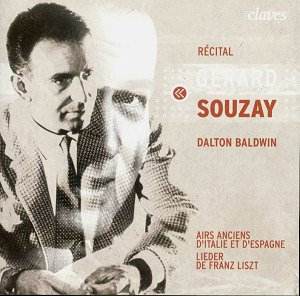
Gérard Souzay and Dalton Baldwin
- Recital: Canzone scordate [selection]; selected and harmonized
by Arne Dørumsgaard
Francesco CAVALLI (1599-1676)
Son ancor pargoletta
Raffaello RONTANI (?-1622)
O primavera
Vincenzo CALESTANI (C17)
Accorta lusinghiera
Domenico BRUNETTI (c.1580-1646)
Deh girate
Giulio CACCINI (1546-1618)
Tu ch’hai le penne Amore
Barbara STROZZI (1619-1677)
Spesso per entro al petto
Nicola MATTEIS (C17)
Caro volto pallidetto
Giacomo CARISSIMI (c.1605-1674)
Soccorretemi, ch’io moro
Bernardo PASQUINI (1637-1710)
Quanto e folle
So ben s’io peno
Bela bocca
Alonso de MUDARRA (c.1508-1580)
Triste estaba el rey David
Gabriel MENA (c.1500-c.1528)
A la caza, sus, a caza
Antonio de RIBERA (C16)
Por unos puertos arriba
Luis de MILAN
(c.1500-c.1561)
Quien amores ten
Juan de ANCHIETA (1462-1523)
Con amores, la mi madre
Francesco de la TORRE (fl.1483-1523)
Pampano verder
ANONYMOUS
Que bien me lo veo
Cristobal de MORALES (c.1500-1533)
De Antequera sale el moro
Pablo ESTEVE (1730-1794)
Alma, Sintamos!
Franz LISZT (1811-1886)
Eight Songs: Oh!
Quand je dors; Le chasseur des Alpes; D’abord,
j’etais près du désespoir; Dans le Rhin, dans
ce beau fleuve; Cloches de Marling; Petit
ange aux cheveux blonds; Prends un rayon de soleil;
Ce doit être merveilleux.
![]() Gérard Souzay (baritone)
Gérard Souzay (baritone)
Dalton Baldwin (piano)
Recorded in August 1958 (Spanish and Italian Antique
Arias) and in the Salle Champs-Elysées, Paris, July 1957 (Liszt)
![]() CLAVES
50-2412 [71.54]
CLAVES
50-2412 [71.54]
BUY NOW
AmazonUK AmazonUS











